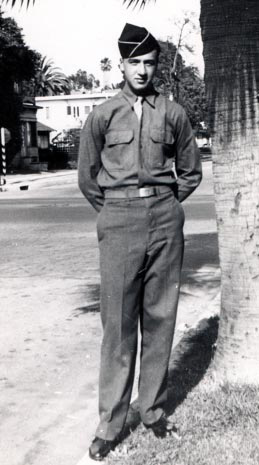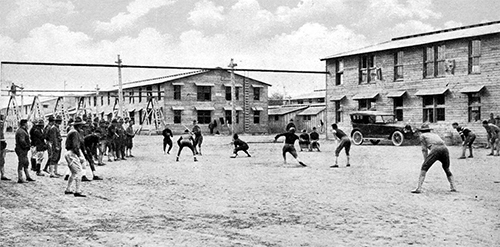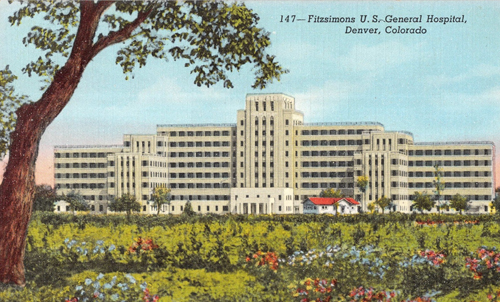Part 1 | 2 | 3 | 4 | 5 | 6 | 7 | 8 | 9 | 10 | 11 | 12 | 13 | 14 | 15 | 16 | 17 | 18 | 19 | 20 | 21 | 22 | 23 | 24 | 25
During the 1990s, a few years before my father, Dave, passed away in December of 2000, he wrote a 35-page autobiography. Excerpts from it will be published here, as companions to the diaries my mother, Dorothy, kept in 1945 and 1946—the year she met Dave. My dad was born in 1927, in Hamilton, Ohio. The family eventually moved to the south side of Chicago.
Part 11
Uncle Sam
Although I was going on 16 as 1943 began, there had been no “teenage years” for me, or for my friends. We all grew up very quickly. With few creature comforts, our lives were centered more around our day-to-day essential needs. We weren't thinking much about the days to come. Having become self-reliant and assured, we were products of the innocence of our time and our ages.
By the time my friends and I were teens, the grown-ups in our circle considered us young adults. They thought us capable of self-direction, and we agreed that we were. The unique economic times that occurred during the 1930s have not been repeated since. When the alternative was nothing or, at best, even less at home, we learned to depend on ourselves to provide for today, and for the next day. But not until it came.
No one in my group of friends was ever left out. We borrowed, we loaned, and we included each other in reaping whatever fortunes came our way. My brother Charlie, too, shared with me, and I with him.
Early in 1943, my good friend Bud received his parent's consent to enlist in the US Navy. Bud was 17. I was not yet 16. Nevertheless, I decided I'd join up, too. Having forged a baptismal certificate to show my age as 18, I accompanied Bud to the recruiting office downtown, on Plymouth Court. Bud, of course, had no trouble being accepted. As for me, I was thrown out. “Don't come back!”, they told me.
Undeterred, and thanks to a former Graham School classmate, Cliff Kerns, I figured out that I could sign up for the draft if I declared that I'd reached the age of 18. At the draft board office, I did just that. No questions were asked, no proof of age required. I was all but in.
Early March of '43 brought a letter from President Franklin D. Roosevelt. “Greetings. You are hereby ordered to report to the Selective Service Examining Station on 59th St. & Wentworth Ave.”
I passed the physical, but there was one problem. A special eye examination was needed, due, of course, to the fact that I was nearly sightless in one eye. The doctor heard my desperation and accepted me, despite my vision. I was sworn-in. I was in the Army now.
During the next 30 days, I wrapped-up my civilian life as songs of the times played on the radio. Tunes like String of Pearls, Mairzy Dotes, Mule Train, White Cliffs of Dover, and Pennsylvania 6-5000 were in the air. My friends Doty and Chuck were leaving, too. Doty to the Coast Guard, and Chuck, having received a deferment, would be working with a barge operator on the Mississippi River.
The second phase of my life was coming to an end.

Dave, in 1943-44
A few days after my 16th birthday, I boarded a train at the Englewood Station with hundreds of other men, bound for Battle Creek, Michigan and processing into the US Army. In Battle Creek, I had an opportunity to apply for Officers Candidate School, having scored high enough on the IQ test and other exams. However, I was aware I looked too young to ever pass as an officer. Furthermore, I didn't know much of anything about what I was getting involved with, and so I chose not to put my name on the sign-up sheet.
From there, us recruits found ourselves aboard another train. This time, back thru Chicago, passing within a few blocks of home, and on to Camp Grant, near Rockford (Ill.) to begin twelve weeks of basic training.
Road marches, rifle pits, barracks life, drills, uniforms. I loved the time there. It all seemed like a wonderful, grown-up world. At graduation time, the company I belonged to was the best in the regiment. We lead the ceremonies, carrying the flags to the tune of the Washington Post March.
“If you each give me ten dollars,” our first sergeant said to our group, “ I promise I will forward all the graduation pictures to all of you.” We never see the photos, the money, or him, again. I learned a very good lesson.

Camp Grant. Estimates are that 100,000 Army medical personnel were trained there.
After the ceremony, we rushed over to the bulletin board, in a hurry to find out what our assignments would be. “Medical Corps at Fitzsimmons General Hospital, Denver, Colorado,” read mine. Two weeks of furlough back home in Chicago followed, and then I was off to Denver. There, I received 60-days of medical training; thirty in a classroom, and thirty within the hospital wards. The class work was boring, the ward work interesting. We treated many wounded, from both the Pacific and European theaters.

Fitzsimmons Army Medical Center.
During the final week at Fitzsimmons, I saw a notice posted on the board. “Volunteers Needed for Special Assignment.” Intrigued, I decided I'd apply. “You're the only one who's volunteered,” the officer said. He continued, “It will require special training, and parachute jumping. We can't tell you anything about where you'll go, or what outfit you will be placed into.”
I was unsure. I was making $35 per month, but the extra $50 monthly parachutist's pay would come in very handy.
“I'll do it,” I said.
A couple of days later, I was handed a special priority letter and a railroad ticket. Destination: Washington, D.C., it read.
* * *
End of Part 11
Part 1 | 2 | 3 | 4 | 5 | 6 | 7 | 8 | 9 | 10 | 11 | 12 | 13 | 14 | 15 | 16 | 17 | 18 | 19 | 20 | 21 | 22 | 23 | 24 | 25
|

